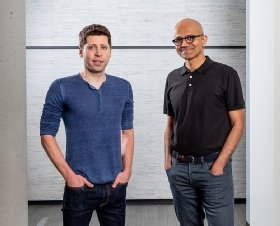
peshkov - stock.adobe.com
Microsoft and OpenAI deal fuels AI products, services on Azure
A new OpenAI partnership with Microsoft aims to provide OpenAI with an influx of capital to boost its AGI research and give Microsoft new supercomputing Azure AI capabilities.
Months after becoming a for-profit company, the formerly non-profit OpenAI revealed a new partnership with Microsoft in which the companies aim to commercialize OpenAI projects, drive research toward artificial general intelligence (AGI) and develop new Azure AI supercomputer technologies.
"Few technology companies, including AI researchers, have the courage to set a goal towards artificial general intelligence," said Mike Gualtieri, an analyst at Forrester, referring to the AI field in which researchers are trying to develop machines that can learn and function like humans.
The Microsoft and OpenAI partnership will make Microsoft the exclusive cloud provider for OpenAI and the preferred partner to market new commercialized products from OpenAI. OpenAI will develop new supercomputing technologies for Microsoft Azure, according to a July 22 blog post by OpenAI.
In addition, Microsoft will invest $1 billion in OpenAI. While a Microsoft spokesman declined to comment on what form that investment will take, he said none of the investment will be made in Azure credits, underscoring Microsoft's commitment to the deal.
However, the companies have not revealed much information about how the money will be allocated.
"I'm suspicious of the $1 billion investment because that is a big number, yet I have not seen any details on how that investment will be spent and what hurdles, if any, need to be met to fund efforts," Gualtieri said.
Building on the past
Previously, Microsoft was the preferred cloud platform for OpenAI, under a partnership from 2016. That pact also saw the two companies work together to advance AI technologies.
This new deal appears aimed to help Microsoft better compete with other enterprise-level cloud and AI vendors, particularly Google, while providing OpenAI with funding to drive its artificial general intelligence research efforts, which still are in early stages.

Created in 2015 as a non-profit, OpenAI received more than $1 billion in funding from the start, with notable investors including Elon Musk (also a founder of the organization) and Peter Thiel signing on. The often controversial Musk, co-founder and CEO of Tesla, left OpenAI in February 2019. AWS also made an initial investment in the company, which aimed to collaborate with universities, research centers and other organizations to research and develop a range of AI policies and technologies.
Over the years, OpenAI has worked to advance AI and developed open source tools, including Gym, a toolkit for creating and comparing reinforcement learning algorithms, and demonstrated many others, including a robotic hand and an AI system that successfully learned to play the team-based strategy game Dota.
In early 2019, the company restructured to create OpenAI LP, a hybrid for-profit and non-profit entity. This new "capped-profit" company will enable investors and employees to get a return on investments, but returns will be capped after a certain point, according to OpenAI.
Competitive edge
The reason for the restructuring, the organization said in a March blog post, is to better raise money to fund research and open source projects while keeping the company at least partially a non-profit.
The new Microsoft and OpenAI partnership is OpenAI's first significant move since that restructuring.
It's unclear which technologies OpenAI will commercialize or how it and Microsoft will commercialize the technologies. The organization has created many specialized tools as well as more open-ended AI technologies, which could potentially be sold as services through Azure. OpenAI, in the blog post, noted simply that it intends "to license some of our pre-AGI technologies."
The deal could ultimately help Microsoft better compete with other large-scale AI-as-a-service providers, including AWS.
"The question I would have for Microsoft and OpenAI is, 'When do you think AGI will be real?'" Gualtieri said.







